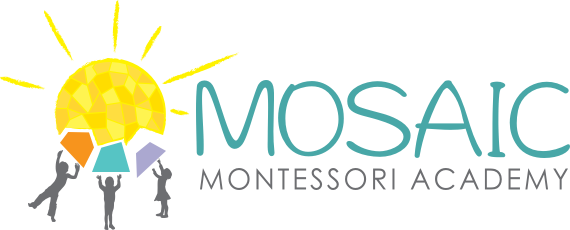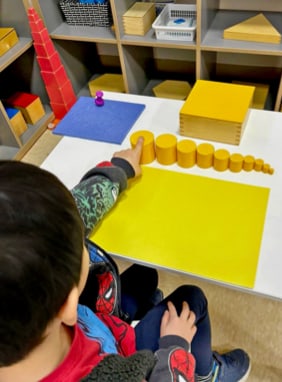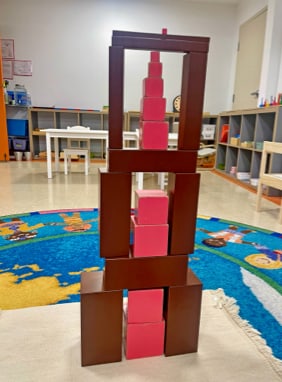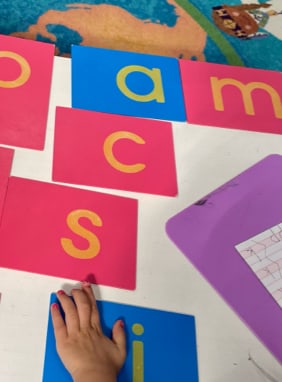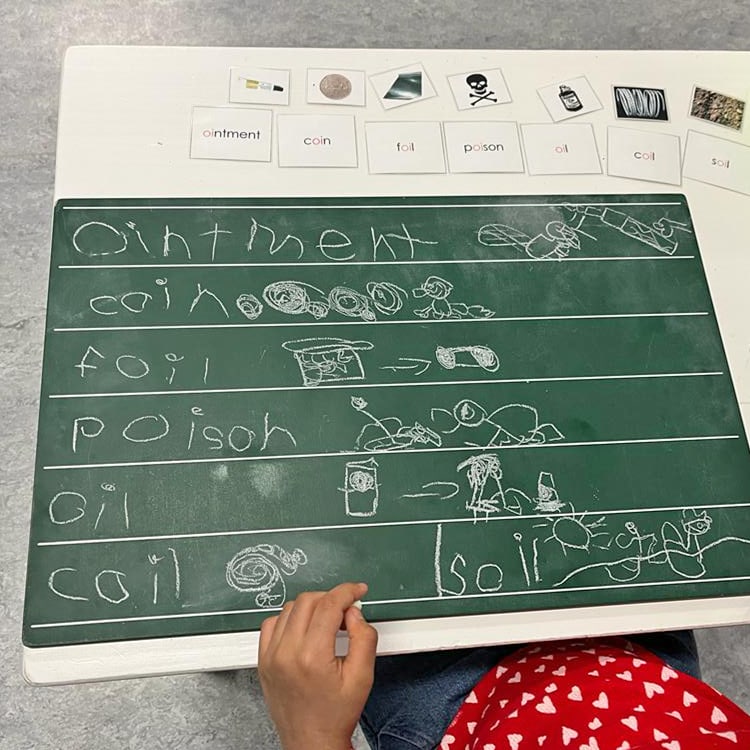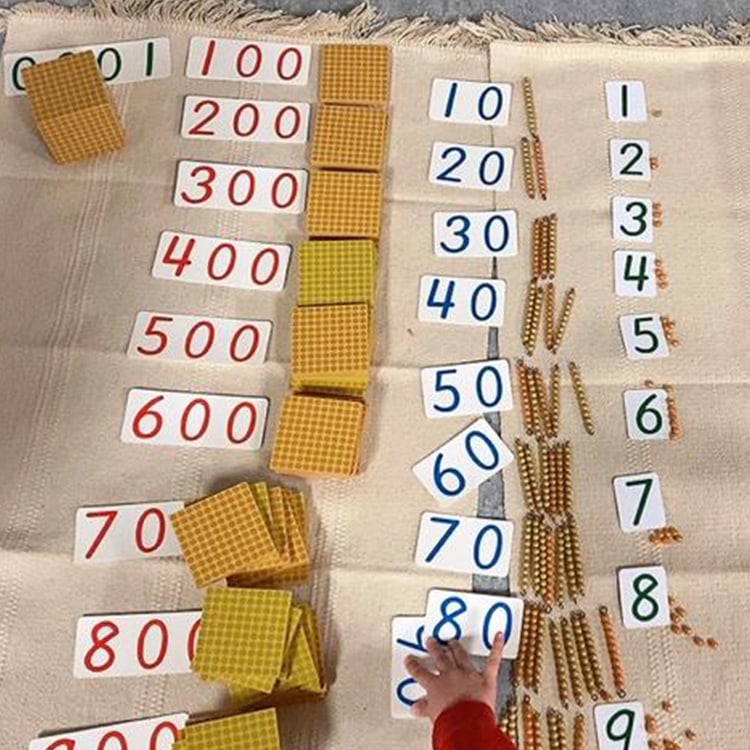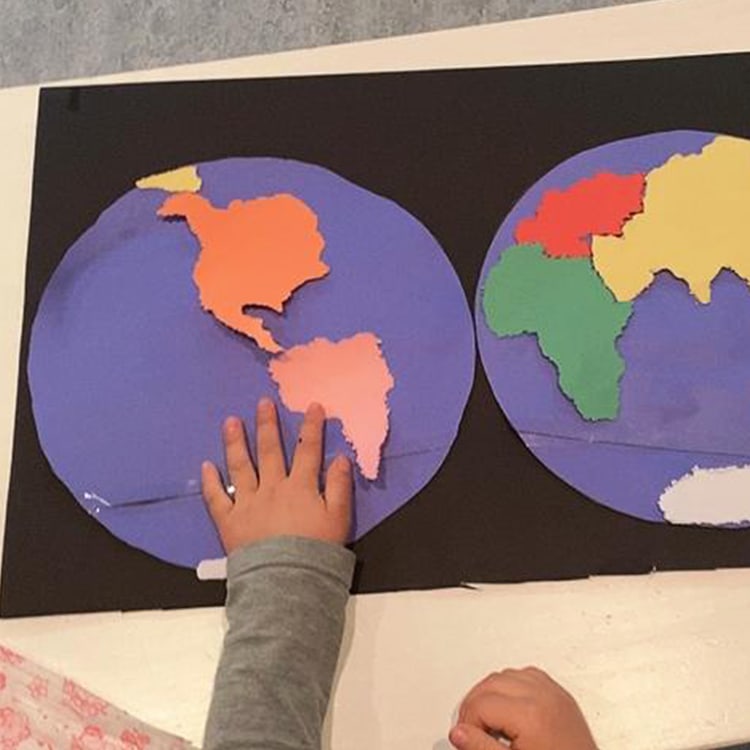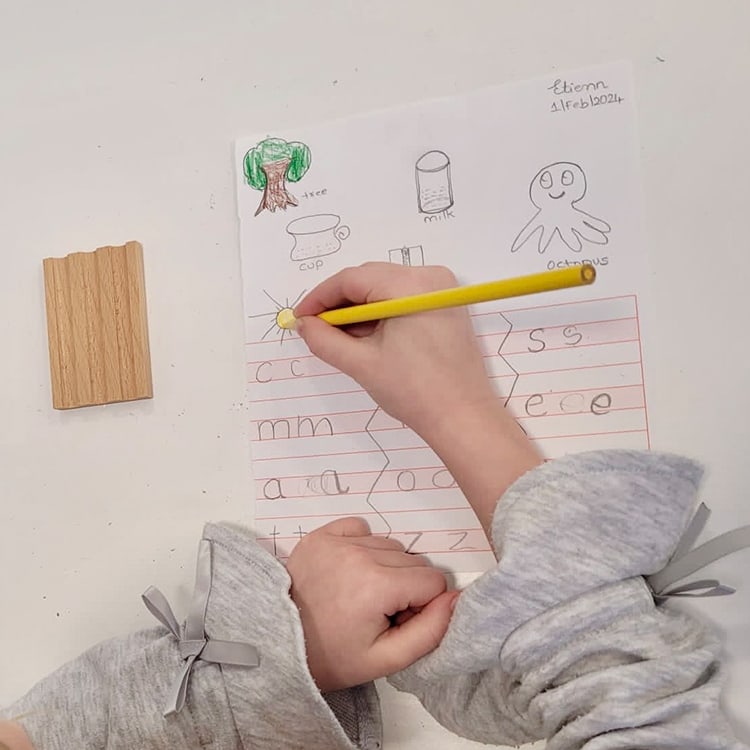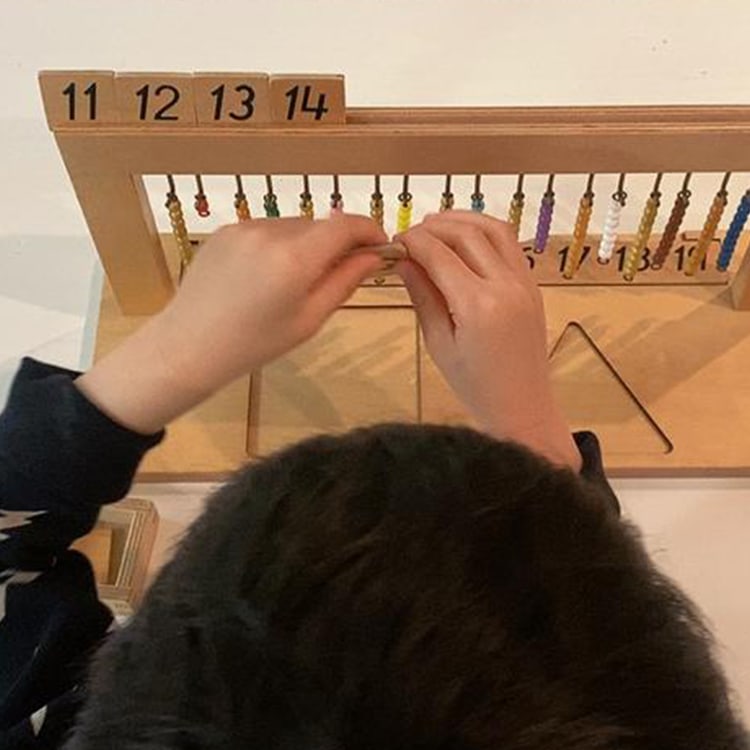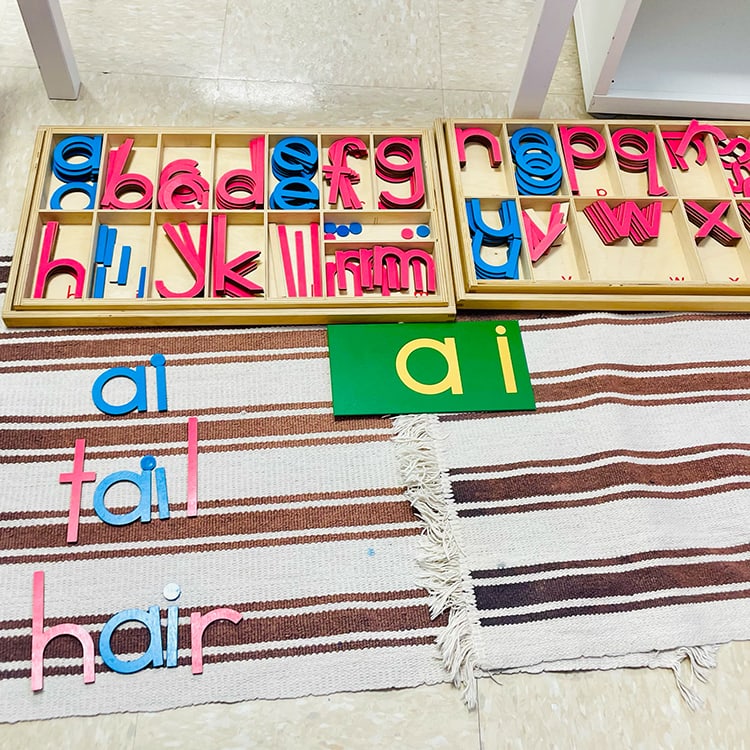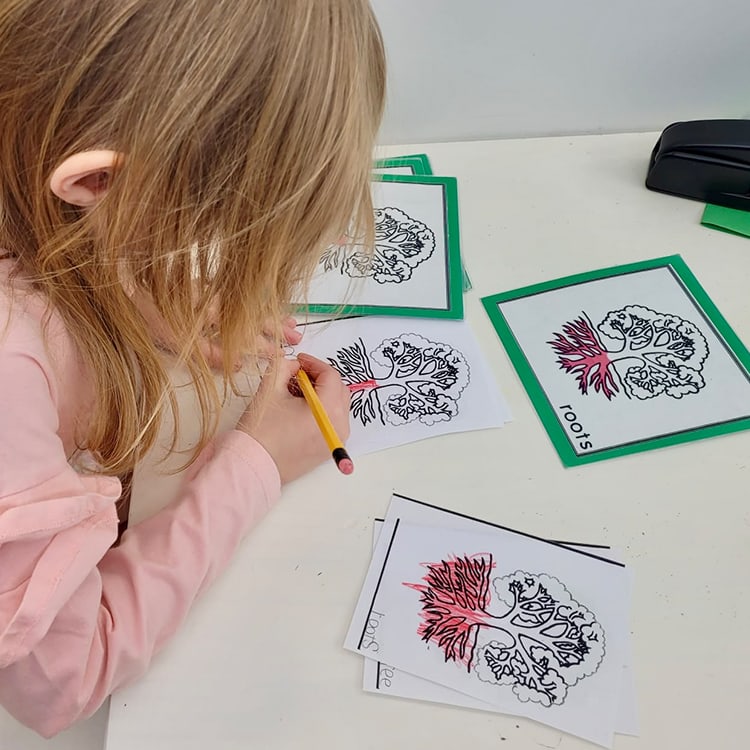Your Guide to Montessori Skills Beyond the Classroom
Mosaic Montessori Academy was created to help young minds thrive. We also want to make this process as convenient and reassuring as possible for you.
Choosing the right early childhood education program for your little one is a big decision. Our FAQ section answers common questions parents have about our childcare centre and how the Montessori philosophy can impact their future education choices.
You can also find more FAQs about the Montessori method and key terms here:
If you can’t find the answer you’re looking for here, please don’t hesitate to reach out—we’re always happy to help.
Frequently Asked Questions
The Montessori method is an educational concept based on principles developed by Dr. Maria Montessori. It focuses on individualized, environment-centric learning.
Students are encouraged to interact and collaborate, solve problems using critical thinking, and gain confidence in their ability to reason and make decisions.
Dr. Maria Montessori was Italy’s first female medical doctor. Her natural passion for mathematics, physics, science, anthropology, philosophy, and psychology fuelled her drive to create what is now known as the Montessori method.
Today, there are more than 22,000 Montessori schools worldwide.
A Montessori education can inspire self-confidence and a general appreciation of learning. Children are given opportunities to test new ideas and concepts, and the solutions they find (and the processes used to find them) can remain a part of them for life.
Montessori students develop leadership skills, an appreciation for the value of collaboration, and a sense of belonging among their peers and society.
As adults and authority figures, children naturally look to you for help. And while it’s important never to turn them away, giving them the space to work through their own problems can be just as crucial.
Instead of just handing them shortcuts, focus on helping your child understand the underlying concepts. This way, they’ll have the skills to overcome roadblocks and tackle challenges head-on.
Give your child plenty of chances to flex their independence and decision-making muscles. Doing so can help them grow into responsible individuals at school and at home.
Remember, the Montessori philosophy works best when practiced at school and home. We’re dedicated to crafting a learning environment that teaches your child about the world and how to navigate it as they grow.
Montessori education is designed for curious or creative children, as it naturally nurtures those qualities. A Montessori school is a good match for families that value independence and personal accountability, where everyone has a distinct and informed voice.
The beauty of the Montessori method is that it helps develop skills that are universally applicable in everyday life. It’s all about teaching children to solve problems, think critically, and collaborate effectively with others. These skills can help set them up for success in other educational environments, no matter what path they choose.
Montessori children tend to make friends easily. They’re used to cooperating with children from all backgrounds, ages, and diverse experiences. Plus, when trying out for sports teams or creative opportunities, Montessori children have more confidence—they believe in their skills and their ability to get even better.
In a Montessori classroom, children learn in various ways: one-on-one, in groups, or independently. This flexibility means they’re ready to thrive in any setting after their Montessori schooling.
Remember, Montessori doesn’t mean life without structure. It’s about encouraging smart problem-solving and putting what you know and think into action in your everyday life.
Research and real-world examples of Montessori success are abundant.
Did you know that the founders of Google were once Montessori students? Montessori is North America’s fastest-growing form of non-traditional education, and it’s with good reason.
Dr. Montessori identified 4 planes of development, with each stage having its own developmental characteristics and developmental challenges.
The early childhood Montessori environment for children aged 3–6 is designed to work with children’s absorbent minds, sensitive periods, and tendencies at this stage of their development.
Learning during these years can occur spontaneously and without effort. Children can enter elementary classes with a clear, concrete sense of many abstract concepts. Montessori helps children become self-motivated and self-disciplined and retain the sense of curiosity that so many children lose along the way in traditional classrooms.
Montessori students tend to act with care and respect toward their environment and each other. They can work at their own pace and ability. The 3-year Montessori experience helps nurture a joy of learning that prepares them for further challenges.
Older children entering Montessori can do quite well in this very different setting, but this will depend on their personality, previous educational experiences, and how they’ve been raised at home.
The 3-year cycle typically works most effectively when children start a Montessori program between ages 2 and 3 and continue through kindergarten. Children beginning at ages 4 or 5 may not consistently reach the same skill level, work habits, or values by the end of the cycle.
Montessori programs can often integrate older children into existing classes, so long as the family understands that some key opportunities might have been missed, potentially affecting their achievement levels compared to peers.
On the other hand, the individualized pace in Montessori classrooms usually eliminates this concern.
Normalization can be a confusing and concerning term for many new Montessori parents. It can sound like we’re taking children who are “not normal” and making them “normal,” which couldn’t be further from what Dr. Montessori intended.
Normalization is just a Montessori word for how young children, buzzing with energy and short attention spans, learn to focus their intelligence, concentrate for long stretches, and discover satisfaction in their work.
One mother put it this way: “My child just does not act the same now that he’s been in Montessori a while. He is usually happy, laughing, and running from one thing to another. In Montessori, he looks interested, sometimes puzzled, and often completely absorbed. I think of normalization as a kind of satisfaction that he seems to take from what he calls hard work.”
Dr. Maria Montessori described the following characteristics of normalization in children between the ages of 3 and 6.
- A love of order
- A love of work
- Profound spontaneous concentration
- Attachment to reality
- Love of silence and of working alone
- Sublimation of the possessive instinct
- Obedience
- Independence and initiative
- Spontaneous self-discipline
- Joy
- The power to act from real choice and not just from idle curiosity
Sometimes, parents worry that having younger children in the same class as older ones will shortchange one group.
They worry that a focus on younger children will absorb the teacher’s time and attention. Some parents are concerned that covering the kindergarten curriculum for the 5-year-olds will prevent them from giving the 3 and 4-year-olds the emotional support and stimulation they need. Both concerns are misguided.
The benefits of multi-aged classrooms include:
- Cooperation in work and play between older & younger children
- A wider range of knowledge, experiences, and abilities to draw upon in the multi-aged setting
- Higher motivation towards learning
- Respect for one another’s individual abilities and experiences
- Children learning to include all others in their activities
- Appropriate peer modelling, especially when older children are role models for the younger ones
- Interaction and friendship opportunities with a broader range of ages
- A greater sense of security and belonging
- Children developing responsibility, kindness, friendliness, diplomacy, language skills, and self-respect
Educational theories and studies show that “students in multi-aged classes tended to be higher or better than those in single-aged classes in the following affective areas: study habits, social interaction, self-motivation, co-operation, and attitudes toward school.” (Gayfer, 1991).
A 5-day program creates the consistency that is important to young children and essential in developing strong Montessori programs.
Since the primary goal of Montessori involves creating a culture of consistency, order, and empowerment, most Montessori schools will expect children to attend 5 days a week.
All children play! They explore new things playfully, watch something interesting with a fresh, open mind, and enjoy the company of treasured adults and other children. They make up stories, dream, and imagine.
This false impression stems from parents who don’t know what to make of the incredible concentration, order, and self-discipline we commonly see among Montessori children.
Montessori students also tend to take what they do in school quite seriously. They commonly respond by saying, “This is my work.” when adults ask what they are doing. They work hard and expect their parents to treat them and their work respectfully. But it’s joyful, playful, and anything but drudgery.
We deliberately limit the amount of materials available in a Montessori classroom. This approach allows us to facilitate situations where more than 1 child would like to work with a particular material at the same time.
The interaction fosters discussion, and the children can develop patience, empathy, and, in later years, collaborative negotiation.
Teachers start sharing “grace and courtesy” lessons with children as young as 3. These friendly reminders continue over the years, encouraging children to learn how to negotiate fairly and with empathy in the classroom.
In the classroom, consistent assessment involves observing and working with the child as the child interacts in the prepared environment.
The materials have inherent checks, so a trained guide can discern if the child has understood the concept by observing a child working with a material.
Educating and developing your child’s character is an essential part of the Montessori method. We teach the child the value of self-care, caring for their environment, personal conduct (including grace, courtesy, and respect), and independent achievement and effort.
By addressing the items above, we help develop young minds into capable, confident decision-makers and team players.
Throughout your child’s journey with us, they’ll interact with the full suite of our classroom materials. This journey is paired with responsibilities that include:
- Choosing what to work on and when to work.
- Owning the consequences and outcomes of decisions.
The freedom that comes with the lack of structure comes hand-in-hand with personal responsibility.
Yes, highly gifted children can find Montessori intellectually challenging and flexible enough to respond to them as unique individuals.
Why Choose Montessori?
Bringing Joy into Learning

Our classrooms are prepared with authentic Montessori materials, chosen to foster a culture of independence, critical thinking, artful expression, and respect while inspiring a love of lifelong learning.
FAQExperienced Educators

Our founder, who is a Montessori-trained teacher, warmly welcomed our first students in 2010. Since then, we’ve proudly created an enriching learning environment dedicated to guiding children in Calgary.
Who We AreA Trailblazing Program

The Montessori Method, developed by Dr. Maria Montessori, has pioneered individualized learning, and we are proud to offer an authentic Montessori program.
Montessori Philosophy
Montessori Helps Develop Skills for Life
Collaboration
Independence
Creativity
Critical Thinking
Motor Skills
Respect
Resources & FAQ

Testimonials
My family and I love Mosaic Montessori Academy, and we are so fortunate to have found them!
My son has been in the program since he was almost 3 and will be graduating and going into Grade 1 this year. I can’t say enough wonderful things about this school and [its] teachers.
Being transplants to the City, we struggled with finding a school for my son as he had never previously been in any group school environment with other children. He went from shy and quiet to a bright and curious boy with many friends and a love of reading!
We could not believe the difference being at Mosaic Montessori has made for him and our family. We are so happy here and can’t wait for our younger child to start soon! Thank you, Mosaic!
Some great positives are:
- An excellent child-to-teacher ratio (one of the lowest I’ve found in our area)
- Loving and wonderful teachers who lavish care and attention on each child.
- A welcoming environment (this school is so much like a big family rather than the institutional feel that some of the big preschools have)
- The parents at the school are so welcoming and helpful. We even have a WhatsApp group where we coordinate birthday parties and set up playdates!
- Engaging Montessori curriculum (a wonderful curriculum of arts, science, math, reading, singing, and life skills). My child is extremely well-rounded for his age. Not only were his academics above average but he also showed all the other wonderful life skills Montessori teaches. This was one of the reasons that he was accepted into a very selective and competitive class for his Grade 1 school. I’m so proud and excited for him!
Daniel H.
My son graduated from Mosaic this June, and even though he has only attended Mosaic Montessori Academy (Royal Oak campus) for 1 year, it has been an amazing year. We chose Mosaic to ensure he had a great foundation before attending public school.
Every day, we find out something new he has learned. At dinner one night, he went over the Canadian anthem, provinces, their capitals, and flags! He really has come out of his shell and become a confident young man!
Thank you to all the staff for everything!
Daniel G.
I am from a smaller town, and so when I realized how much choice was out there for an education in Calgary, it was daunting and stressful! Every parent wants to pick the right option for their child.
Both my children are girls, yet they couldn’t be more different.
I have never regretted or doubted putting my kids in this school; it has been a blessing. They are very organized and consistent. They teach so many things that kids don’t always get in other preschools. Respect for teachers, other students, patience, [and] everyday courtesy, like letting others have a turn to speak or learn to clean up after themselves.
The setup and science behind the Montessori way are incredible. The activities are fun [and] self-directed, with the guidance of a directress. When I’ve observed 27 kids between the ages of 3–5 in a room, I have been shocked with the orderly, content way the children conduct themselves and respect other kids while there.
Their kindergarten year is the leadership year, and your child is shown how to mentor the younger children in the class. Both of my kids are strong leaders because of this program, and it visibly shows.
My younger daughter can have a strong personality at times but is extremely intelligent and thrives in this setting.
She’s recently shown me each province in Canada (that she meticulously punched out of paper using a pin, a popular activity in class), named each capital city for the corresponding province, and each flag too…amazing for a 5-year-old, right?
She’s also excited to learn to read and has had the confidence to read her book in front of the class thanks to their accepting, respectful class atmosphere.
She’s excited to go to school and learn every day, and her directress, Mrs. Maria, has a magic touch with her—and I truly believe she is getting the best education possible.
I would choose this school over and over again. Thank you for caring so much 🙂
Erin R.
Mosaic Montessori Academy is one of the most profound and exceptional schools in Calgary. Their knowledge and quality of teaching, with their supportive learning environment, is absolutely amazing.
I have seen my child develop reading and writing skills that I could not have taught them myself.
The knowledge they have gained in various aspects of real life is amazing. Mosaic Montessori Academy has allowed me to unlock educational opportunities for my children that helped them build a strong foundation for their school years.
Having my kids join Mosaic Montessori is the best decision I have made for my kids. Thank you, Mr. and Mrs. Ali.
Zahra H.
We can’t speak highly enough about Parkdale Mosaic Montessori Academy.
Over the past two years, we have watched our children thrive under the kind and nurturing care of their teachers, each of whom are obviously passionate about what they do and their students. In particular we notice that the teachers genuinely seek to understand our children (their likes and dislikes, strengths and areas of growth etc.) and engage them with that in mind. Independence, which we value, is also encouraged. When we were considering kindergarten, the staff went above and beyond in helping us choose the most suitable option; their guidance was invaluable. Most importantly, our children continue to be excited about school, where they can find friendships and develop their love for learning. Looking back, choosing this school was a wonderful decision.
Thank you!
TF & AF
Our Google Reviews
Our Location
Our Address
- 2919 8 Ave NW
- Calgary, AB T2N 1C8
Contact Information
- Phone: 403-612-8339
- Email: [email protected]
